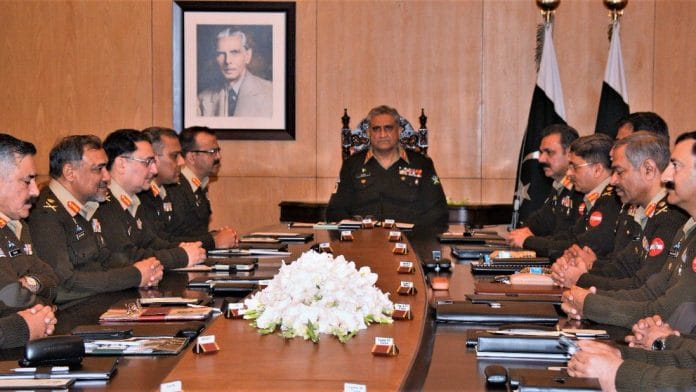If Gen. Bajwa expands his army’s operations beyond Lashkar-e-Jhangvi and includes the LeT and other anti-India terror groups, he will be a south Asian pioneer.
The killing of Salman Badeni, a Lashkar-e-Jhangvi (LeJ) leader by security forces in Balochistan Wednesday once again demonstrates that the Pakistan Army has both the determination and the muscle to take on terrorist groups it wants to cut down to size, but it won’t touch organisations like the Lashkar-e-Taiba (LeT), set up to wreak havoc against its “enemy”, India.
It is in operations like this — where an army colonel lost his life — where Pakistan’s good terrorist-bad terrorist thinking goes down a slippery slope.
The LeJ leader belonged to the latter formulation, and had been involved in the killing of more than a hundred people from the minority Shia Hazara community in Balochistan over the last couple of years. The self-avowed anti-Shia terror group had sent a frisson of fear across the province, and Balochistan’s Shias had marched in protest in April, demanding an end to the targeted killings.
The unrest had forced Pakistan Army chief General Qamar Javed Bajwa recently to promise protection to the community, while the members of Inter-Services Public Relations (ISPR), assured the Hazaras that their attackers would “suffer twice as much”.
The day after, Chief Justice of Pakistan Mian Saqib Nisar swung into action and issued a suo motu notice of the targeted killings. And within two weeks, Badeni was killed. Gen. Bajwa’s promise was fulfilled, but only after enough pressure was built up from citizens as well as the judiciary to take action.
Resource-rich Balochistan has always had an uneasy relationship with Pakistan’s security forces. Over the last few weeks, the peaceful Pashtun Tahafuz Movement (PTM) has held rallies, protests and demonstrations against the grave human rights violations taking place in this province and elsewhere in the country. The PTM has demanded an end to forced disappearances, torture and harassment at the hands of Pakistani security forces. It has openly indicted military authorities for its extra-constitutional harassment in the Federally Administered Tribal Areas (FATA). Manzoor Pashteen of the PTM has been especially critical of the army and accused it of being hand-in-glove with the Taliban.
PTM’s demonstrations, however, have been largely blacked out in the Pakistani media, indicating a self-censorship of stories critical of the military establishment.
Certainly, the impact of the demonstrations has been like a dam breaking across Pakistan, with ordinary people recounting their most intimate horrors at the hands of security forces on social media. It is as if the silence of decades is being ruptured. So much so that the former station head of the ISI, Major R. Aamir, speaking at a Peshawar University function Wednesday, even accused former army chief and Bajwa’s predecessor Gen. Raheel Sharif as being the “most violent army chief in Pakistan’s history” and a “murderer of Pashtuns”.
https://twitter.com/fjapakistani/status/996674743997616128
This is unprecedented. The army is a holy cow in all of Pakistan — there is little else that is holier. For an ISI officer, that too stationed in the Pashtun heartland, in Peshawar, to criticise his own military establishment is the equivalent of setting off a minor earthquake.
There’s more. Balochistan’s strategic significance for Pakistan has led the army to keep it under tight control — not only because of its proximity to Iran, its enormous mineral resources, or the fact that it is home to the Gwadar military port, but also because Pakistan’s most important strategic project, the China-Pakistan Economic Corridor (CPEC) criss-crosses the province. China’s decision to invest in Gwadar and turn it into ‘the next Dubai’ will be a big boost for the country’s economy.
However, Baloch activists, alongside anti-LeJ demonstrators, have been protesting the forced sale of Baloch lands for the CPEC. Many activists have also tried to discourage international investors from investing in the project until the issue of human rights violations are resolved.
Certainly, Gen. Bajwa’s determination to eliminate the LeJ leader Wednesday must be lauded. This shows the Pakistan military has the proven prowess to track down terrorist outfits.
But recall the brouhaha that broke out all over Pakistan, no doubt guided by the military establishment, when Pakistan’s ousted prime minister Nawaz Sharif last week stated that “non-state actors” were “allowed” to cross the border and carry out the Mumbai attacks in 2008. In fact, the spokesman for the Pakistan Army even told a group of visiting Indian journalists that it would have no problem if Lakshar-e-Taiba (LeT) founder and prime accused in the Mumbai attacks, Hafiz Saeed, joined electoral politics.
Ironically, his statement was made on the same day as the operation against the home-grown anti-Shia terrorist group.
If Gen. Bajwa expands his army’s operations beyond LeJ and includes the LeT and other anti-India terrorist groups, he will surely go down in south Asian history as a man who had the courage to go where no Pakistan Army chief has gone before.
But if he stops short, questions over who the military is willing to protect, and for what motive, will never go away.






